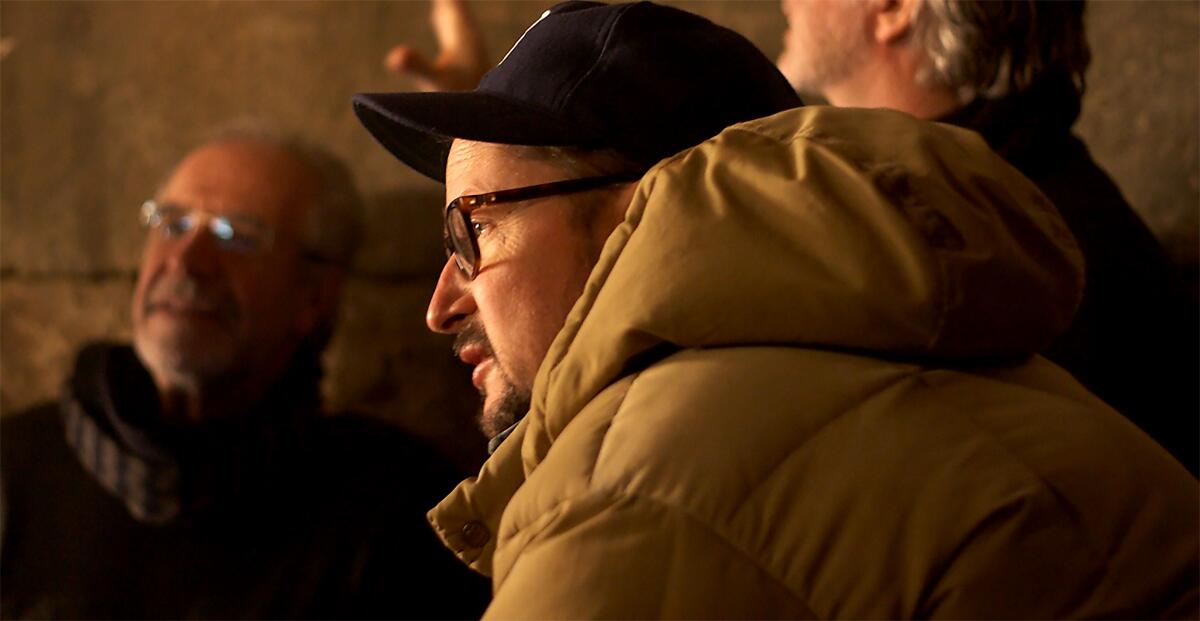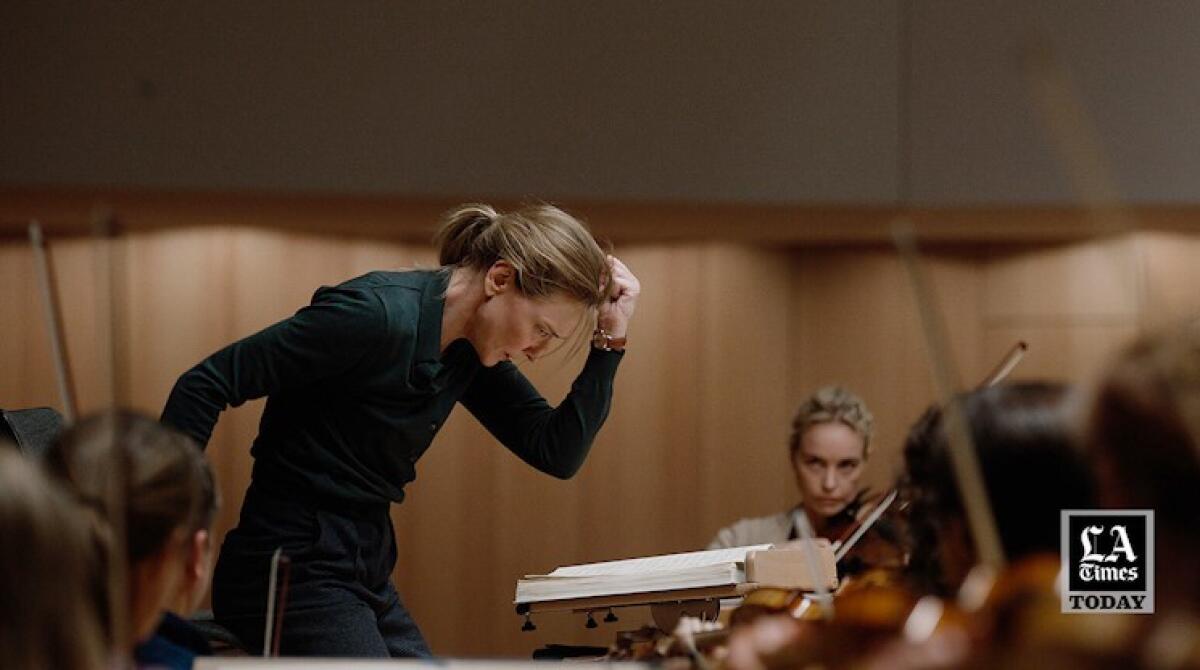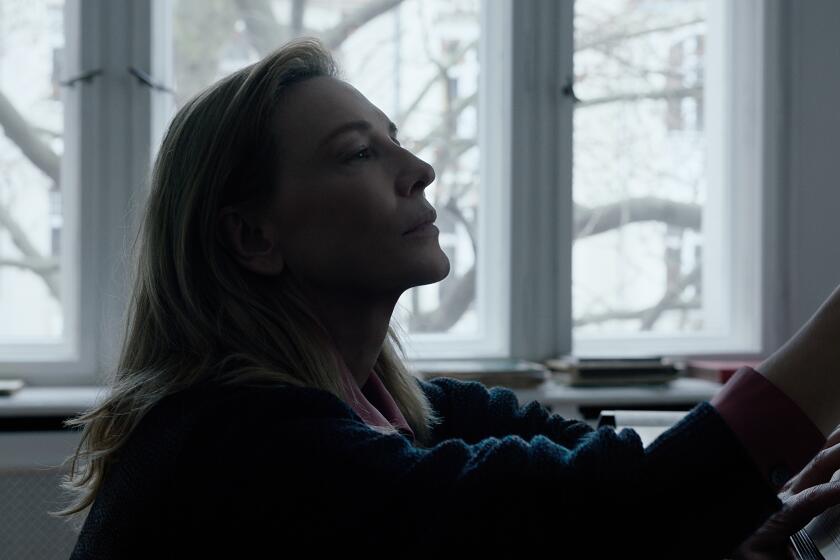Todd Field uses the ‘genius’ of Cate Blanchett to tackle the abuse of power in ‘Tár’

- Share via
“It was sort of like all of us collectively jumping off a cliff together and trying to grow wings on the way down,” says Todd Field, describing his first day on the job as a movie director since making his last film during the George W. Bush administration. “There was no time to really think about anything other than the fact that we had to be absolutely buttoned up and extremely certain about our choices in terms of how we were going to execute.”
Early in the production of his new movie “Tár,” Field had gathered 100 classical musicians in a German concert hall to rehearse Mahler’s Fifth Symphony for the actor at the podium with the baton in her hand. Their conductor for the day: Cate Blanchett. Adding to the pressure, Field insisted on flawless live performance. “I have this allergy to films where people are faking it,” he says. “Every note you hear in this film is happening in real-time.”
“Tár” casts Blanchett as a fierce and gifted maestro who spirals downward from her lofty perch as the first woman conductor to lead the Berlin Philharmonic. Blanchett dramatizes Lydia Tár’s downfall with a searing performance almost certain to earn the two-time Oscar winner her eighth Academy Award nomination.
“I wouldn’t have made the film without Cate,” says Field, speaking from New York City. “I wrote ‘Tár’ for her because of this very rich conversation she and I had 10-plus years ago about a project we wanted to do together that Joan Didion and I had written. The project never happened but the echo from that conversation was lasting and loud. Cate has a tremendous capacity for looking at narrative outside of her work as a performer and she’s truly one of the great minds of our age. Who better to play a genius, than a genius?”
Rare is the filmmaker who casually mentions the late Joan Didion as a collaborator, but their political thriller “As It Happens” was just one of many Field-affiliated projects that failed to materialize after his 2006 drama “Little Children” snagged Academy Award nominations for Kate Winslet and Jackie Earle Haley. Field’s equally dark 2001 debut effort “In the Bedroom” earned a best picture nomination plus nods for Tom Wilkinson, Sissy Spacek and Marisa Tomei. Field himself picked up writing nominations for both movies.
The writer-director of ‘Tár’ on why the end credits of the movie play at the beginning, perplexing some audiences.
Given those back-to-back art-house sensations, cinephiles had every reason to expect a steady stream of Todd Field movies.
Instead, for 16 years: nothing. What happened?
“I simply haven’t been able to find the right home for any of my projects,” Field replies. “Sometimes you’d work on something and the people who hired you are not at the company anymore by the time you finish the script. Or you write something where you think you’re having the same conversation with someone [at the studio] but they have a different idea.”

Budget issues also help explain the string of unproduced projects that came and went. Field, who lives in Maine with his family, kept his hand in the game by directing TV commercials. His moviemaking standards remained uncompromised. “I make a particular kind of film that interests me and I don’t pretend to expect that those films will interest anyone else,” Field says quietly. “I’ve chosen projects that were really challenging in terms of how much people want to spend. Some projects had backing but they wanted to make them at a price point that was untenable if you have any hope of spending a year-plus of your life working seven days a week wanting to come out the other side with something you’re not ashamed of.”
“Tár” ended the dry spell. “It was nice to have [Focus Features executives] Peter Kujawski and Kiska Higgs say ‘Write whatever you want and we’re making it.’”
And what Field wanted to write about was power. He saw the world of classical music as a “handy milieu” for exploring symphony orchestras’ pyramid-like hierarchies. The only problem: Field, a self-described “jazz snob” who’d earned a college scholarship on the strength of his trombone playing skills, did not know very much about classical music. To educate himself, he read “For the Love of Music: A Conductor’s Guide to the Art of Listening” by John Mauceri. A former assistant to Leonard Bernstein who directed the Hollywood Bowl Orchestra for a number of years, Mauceri became an invaluable advisor, Field says.
“After I read John’s book, I called him and for the next three or four weeks, he basically gave me a master class about the language of that world, the references, the way people speak to one another, the inside jokes, all of that. Hopefully, people from the world of classical music who watch this movie aren’t going to say it’s just a toy town version.”
Blanchett committed to “Tár” in September 2020. She learned German, took piano lessons and trained with conducting coach Natalie Murray Beale. “Cate would tell you, ‘Yes I did all these things, but only to get inside of this woman’s skin and figure out her psychology,’” Field says. “Lydia’s sitting atop this power structure, which involves wile and guile and pocketing political currency and spending that currency. She’s become obsessed with legacy, which is a dead end, and there’s a part of her that’s being squashed because she’s kind of estranged from the child in her that wanted to be a musician in the first place.”
As a producer as well, Field and his team came well prepared to shoot “Tár” in Germany, New York City and Southeast Asia, but he did not anticipate one big surprise that awaited him once filming began. “I shoot commercials all the time where you put your pleasure into technical things, what you can do with the camera, what you can do with sound,” Field says. “What you don’t have is a relationship with actors. Being able to work with actors again — I didn’t realize how much I’d longed for that. This fellowship had been absent from my life for so long and I missed it. Deeply.”
More to Read
From the Oscars to the Emmys.
Get the Envelope newsletter for exclusive awards season coverage, behind-the-scenes stories from the Envelope podcast and columnist Glenn Whipp’s must-read analysis.
You may occasionally receive promotional content from the Los Angeles Times.








